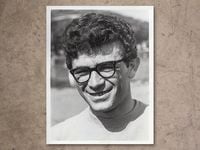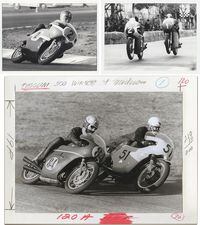You can't talk about Renzo Pasolini without Giacomo Agostini and Jarno Saarinen. The three riders were wound up together in pursuit of the 1972 and 1973 Motorcycle Grand Prix championships, swapping podium positions in the 250cc and 350cc classes over the course of a season and a half. They were standouts in an era chock-full with bravery and innovation. Two of the three would be lost in a racing tragedy too soon.
Pasolini was a wild card, his understanding of bikes at speed curated through years of competing in motocross as a kid.
He rode with the all of himself, throwing the bike at every corner and adopting now-common body English before most of his contemporaries. Imagine it: a line of stodgy, upright riders slinking through a Nordschleife chicane and Pasolini ripping through the heart of them while dangling from his Aermacchi Harley-Davidson. Sometimes it worked. Sometimes he found himself sliding across the tarmac.
Saarinen was a privateer, an engineer who spent his off hours earning championship points with Yamaha. Agostini was a professional, arriving early for every race. Studying, preparing. Fans called him The Computer. Pasolini was something else entirely, a man made of passion for life and motorcycles. He embodied the riding spirit of Italy, and fans adored him.
Pasolini and Agostini were natural rivals, and their battles split Italy down the center, but the country was united in grief after a fiery crash at Monza took both Pasolini’s and Saarinen’s lives on the first lap of the 250cc race. Saarinen was 28. Pasolini was 32 and left behind a wife and two children. He never earned a points championship and lost the 1972 250cc title to Saarinen by just one point, but his fingerprints remain all over the sport he loved. So much so that in 1987, Ducati released the Paso, a bike named in honor of the most Italian of motorcyclists.
Today, Pasolini’s Benelli 350/4 is kept in race-ready condition by Team Obsolete in Brooklyn, New York.















/cloudfront-us-east-1.images.arcpublishing.com/octane/3TIWWRV4JBBOLDVGRYECVVTA7Y.jpg)
/cloudfront-us-east-1.images.arcpublishing.com/octane/KIX5O23D5NAIBGFXBN3327DKZU.jpg)
/cloudfront-us-east-1.images.arcpublishing.com/octane/7GJYDUIPXRGMTMQKN6ONYOLBOU.jpg)
/cloudfront-us-east-1.images.arcpublishing.com/octane/MUQLOVLL2ZDGFH25ILABNBXKTI.jpg)
/cloudfront-us-east-1.images.arcpublishing.com/octane/TNOU5DNE2BC57MFPMGN2EIDXAM.jpg)
/cloudfront-us-east-1.images.arcpublishing.com/octane/GTCXACQGJ5HAPDTGWUQKDEH44E.jpg)
/cloudfront-us-east-1.images.arcpublishing.com/octane/S35YGSEMEZB4BLTDJTSZPF4GLA.jpg)
/cloudfront-us-east-1.images.arcpublishing.com/octane/5UOT6HPX2JFMRJAX6EH45AR4MQ.jpg)
/cloudfront-us-east-1.images.arcpublishing.com/octane/OKWOJWAKP5EP3OACCRRWPCIX2Q.jpg)
/cloudfront-us-east-1.images.arcpublishing.com/octane/2WF3SCE3NFBQXLDNJM7KMXA45E.jpg)
/cloudfront-us-east-1.images.arcpublishing.com/octane/G4MG6OUCJNBSHIS2MVVOTPX65E.jpg)
/cloudfront-us-east-1.images.arcpublishing.com/octane/IIGGWFOTOJGB7DB6DGBXCCMTDY.jpg)
/cloudfront-us-east-1.images.arcpublishing.com/octane/QSTCM6AVEZA5JJBUXNIQ3DSOF4.jpg)
/cloudfront-us-east-1.images.arcpublishing.com/octane/U4I7G625B5DMLF2DVIJDFZVV6M.jpg)
/cloudfront-us-east-1.images.arcpublishing.com/octane/B6XD6LS6IVCQPIU6HXDJSM3FHY.jpg)
/cloudfront-us-east-1.images.arcpublishing.com/octane/ICL63FEDDRDTTMINYICCEYGMDA.jpg)
/cloudfront-us-east-1.images.arcpublishing.com/octane/FCGZHQXRBZFLBAPC5SDIQLVF4I.jpg)
/cloudfront-us-east-1.images.arcpublishing.com/octane/WNOB6LDOIFFHJKPSVIWDYUGOPM.jpg)

/cloudfront-us-east-1.images.arcpublishing.com/octane/X33NU3E525ECRHXLNUJN2FTRKI.jpg)
/cloudfront-us-east-1.images.arcpublishing.com/octane/6KKT5NNL2JAVBOXMZYS5ZO76YA.jpg)
/cloudfront-us-east-1.images.arcpublishing.com/octane/J5RKG5O455GMPGQRF2OG6LRT7A.jpg)
/cloudfront-us-east-1.images.arcpublishing.com/octane/GX2CIZKQVRH2TATDM26KFG2DAE.jpg)